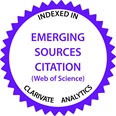Reviewing Procedure
All submitted articles go to the editorial team through a preselection procedure, and articles selected during the procedure are sent for review.
Each (preselection-selected) article is reviewed anonymously by two independent, anonymous reviewers (a double-blind review process).
The review has a written form and ends with the reviewer's recommendation (minor revision, major revision, rejection) (Review Form).
After receiving the review, the editorial secretary gives detailed information about the reviewers' comments on the article and the final decision on publication (one made by the Editor-in-Chief).
If any doubts arise or the opinions of the Reviewers are extremely different, the Editorial Board appoints an additional reviewer.
Criteria for qualification or rejection of the text: originality of the research method used and treatment of the topic; reliability of previous research; quality of own research (if applicable); timeliness of research/theoretical considerations; content, methodology and inference validity; contribution of the text to the development of the discipline; selection of literature.
Once a year, the editors post the complete list of reviewers on the website.
Reviewers' responsibilities
Editorial decisions
The reviewer supports the Editor-in-Chief in making editorial decisions and may similarly support the author in improving the paper.
The principle of anonymity
All reviews are performed anonymously, and the editorial board does not disclose author data to the reviewers.
The principle of timeliness
The reviewer is obliged to deliver the review within the established deadline. If, for some reason (content, lack of time, etc.), one cannot meet the deadline or undertake the review, one should immediately inform the editorial secretary.
Principle of confidentiality
All reviewed papers and their reviews are confidential. Disclosure of works to third parties is not permitted (except to those who participate in the publishing process). Reviewers and others involved in the publishing process may not use the research contained in unpublished manuscripts without the author's express permission. Information obtained during the review process is treated as confidential and may not be used for the personal benefit of those involved.
The principle of maintaining standards of objectivity
The review should be objective. Personal criticism of the paper's author is considered inappropriate. All reviewer's comments need adequate arguments.
The principle of the reliability of sources
Reviewers should identify publications not cited by the author of the paper. Any statement of a previously discussed observation, source, or argument must be accompanied by an appropriate citation. The reviewer should also inform the editorial secretary of any significant similarity, partial overlap of the content of the reviewed work with any other published and known work or suspicion of plagiarism.
Principle of reviewer's conflict of interest prevention
Confidential information or ideas that emerge as a result of the review must be kept confidential and may not be used for personal benefit. Reviewers should not review works involving a conflict of interest due to the relationship with the author, company or institution connected with the work. If one notices the possibility of a conflict of interest, one is obliged to signal this fact to the editors and return the text under review. The reviewer may also decline to review the text due to insufficient knowledge.
A reviewer may not delegate the task of writing a review to another reviewer without the express prior consent of the editorial board. Reviewers and editors shall report any cases of dishonesty in the unauthorized use of intellectual property. They shall also inform the publisher if they become aware of any ethical code breaches.
Procedures for dealing with potential violations
If any manifestation of scientific dishonesty is detected, the publisher will follow the procedure proposed by the Committee on Publication Ethics (COPE).
When considering copyright violations, the editors will use the assistance of an anti-plagiarism program (e.g., iThenticate).







